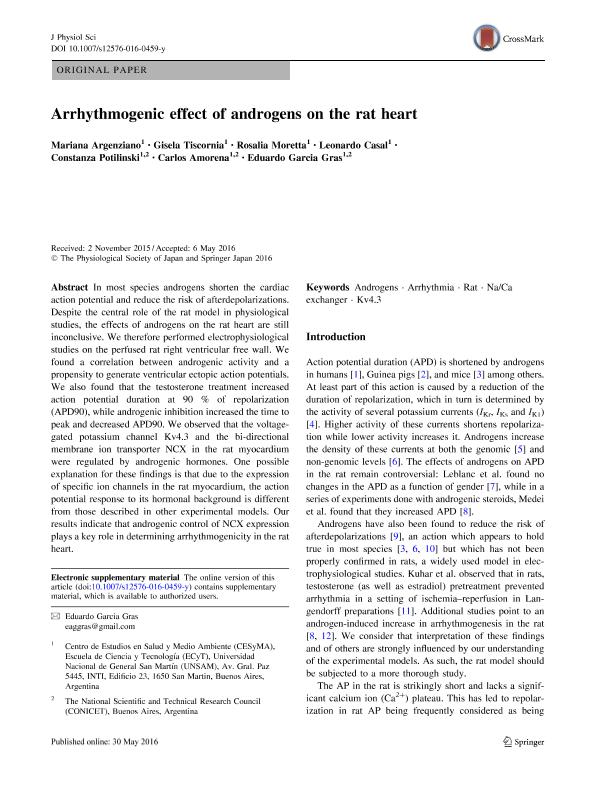Artículo
Arrhythmogenic effect of androgens on the rat heart
Argenziano, Mariana Alejandra ; Tiscornia, Gisela Carla
; Tiscornia, Gisela Carla ; Moretta, Rosalia Ester
; Moretta, Rosalia Ester ; Casal, Leonardo
; Casal, Leonardo ; Potilinski, María Constanza
; Potilinski, María Constanza ; Amorena, Carlos Ernesto
; Amorena, Carlos Ernesto ; Garcia Gras, Eduardo Andres
; Garcia Gras, Eduardo Andres
 ; Tiscornia, Gisela Carla
; Tiscornia, Gisela Carla ; Moretta, Rosalia Ester
; Moretta, Rosalia Ester ; Casal, Leonardo
; Casal, Leonardo ; Potilinski, María Constanza
; Potilinski, María Constanza ; Amorena, Carlos Ernesto
; Amorena, Carlos Ernesto ; Garcia Gras, Eduardo Andres
; Garcia Gras, Eduardo Andres
Fecha de publicación:
01/2017
Editorial:
Springer Tokyo
Revista:
Journal Of Physiological Sciences
ISSN:
1880-6546
Idioma:
Inglés
Tipo de recurso:
Artículo publicado
Clasificación temática:
Resumen
In most species androgens shorten the cardiac action potential and reduce the risk of afterdepolarizations. Despite the central role of the rat model in physiological studies, the effects of androgens on the rat heart are still inconclusive. We therefore performed electrophysiological studies on the perfused rat right ventricular free wall. We found a correlation between androgenic activity and a propensity to generate ventricular ectopic action potentials. We also found that the testosterone treatment increased action potential duration at 90 % of repolarization (APD90), while androgenic inhibition increased the time to peak and decreased APD90. We observed that the voltage-gated potassium channel Kv4.3 and the bi-directional membrane ion transporter NCX in the rat myocardium were regulated by androgenic hormones. One possible explanation for these findings is that due to the expression of specific ion channels in the rat myocardium, the action potential response to its hormonal background is different from those described in other experimental models. Our results indicate that androgenic control of NCX expression plays a key role in determining arrhythmogenicity in the rat heart.
Palabras clave:
Androgens
,
Arrhythmia
,
Kv4.3
,
Na/Ca Exchanger
,
Rat
Archivos asociados
Licencia
Identificadores
Colecciones
Articulos(SEDE CENTRAL)
Articulos de SEDE CENTRAL
Articulos de SEDE CENTRAL
Citación
Argenziano, Mariana Alejandra; Tiscornia, Gisela Carla; Moretta, Rosalia Ester; Casal, Leonardo; Potilinski, María Constanza; et al.; Arrhythmogenic effect of androgens on the rat heart; Springer Tokyo; Journal Of Physiological Sciences; 67; 1; 1-2017; 217-225
Compartir
Altmétricas



